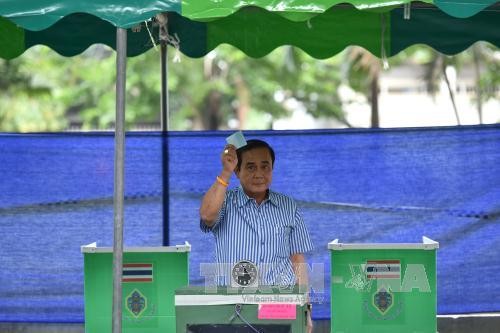(VOVworld) – With 94% of votes counted, it appears that the majority of Thai people support the new Constitution. The official results will be released on Thursday. This demonstrates the Thai people’s desire for stable politics and economic growth.
 |
| Thai Prime Minister Payut Chan-ocha cast ballot in Bangkok on August 7 (Photo: Xinhuanews/VNA) |
The August 7 referendum was the first in Thailand since Prime Minister Prayut Chan-ocha, who was Commander in Chief of the Royal Thai Army, ousted the government of Yingluck Shinawatra in 2014. Thailand is divided after a decade of political instability which has hampered economic growth, impaired democracy, and left many street demonstrators dead.
According to early referendum results, more than 60% of voters are for the new Constitution. In the northeast region, nearly all voters rejected the Constitution written by the military administration. But in Bangkok, the support rate reached 70%.
Why Thai people like the draft Constitution
The referendum was a test of people’s approval for Prime Minister Prayut Chan-ocha, who seized power after a coup in 2014. Prayut’s government is seen as creating stability by ending unrest and political division in Thailand. In the wake of the political crisis, national tourism, investment, and exports were stagnant. But in the first quarter of this year, Thailand’s GDP growth reached 3.2%, the biggest increase in 3 years. This is an undeniable effect of the military government, which has adopted 10 measures to stimulate the economy, igniting new hope among the people.
The draft Constitution is also expected to help bridge political factions, which were divided for a decade.
Observers say the Thai people were fed up with political upheavals since Prime Minister Thaksin Shinawatra was ousted in 2006 and that they want a greater role of the army in formulating a government which ensures stability for national development. Parinya Thewamarumitkul, Prof. of Law at Thammasat University, said the referendum result shows the people’s worries of a possible recurrence of unrest. Political analyst Sukhum Nuansakul interpreted the poll result as the people’s acceptance of a military-led government. It’s more important that the people no longer believe in politicians whom they used to love.
Protesters said the result is not accurate as Prime Minister Prayuth prohibited public discussions of the new Constitution. Those who criticize the draft may face a sentence of up to 10 years’ imprisonment. Those prohibitions made the people lose their patience and sought to promptly finalise the prolonged process.
Cautious reactions from parties
Leaders of the Pheu Thai Party, which supports former Prime Minister Thaksin Shinawatra, declared their acceptance of the referendum result, adding that they will fight for democracy in any circumstances. But they warned that the low voter turnout clearly demonstrated voters’ attitudes. In fact, only 55% of the total 50.5 million voters cast ballots, 2% fewer than in the 2007 referendum. Yingluck Shinawatra, a member of the Pheu Thai Party and former Prime Minister, said the majority of Thai voters in favour of the draft Constitution mark a step backward for Thailand because this document is undemocratic. Former Prime Minister Abhisit Veijajiva, leader of the Democrat Party, voiced his acceptance and called on other parties to do the same. He noted that Thailand’s biggest concern now is to implement a roadmap towards a general election in 2017.
The incumbent Prime Minister confirmed that the general election will be held next year as scheduled, whether the new Constitution is approved or not. Deputy Prime Minister and Defense Minister Prawit Wongsuwon ruled out the possibility that any army general will run for election or be nominated for Prime Minister. He promised that once there are appropriate laws, politicians will be allowed to run in election campaigns.
Thailand has witnessed military coups and coup attempts since 1932 when an absolute monarchy was replaced by a constitutional government. If approved, this will be the 20th Constitution of Thailand.